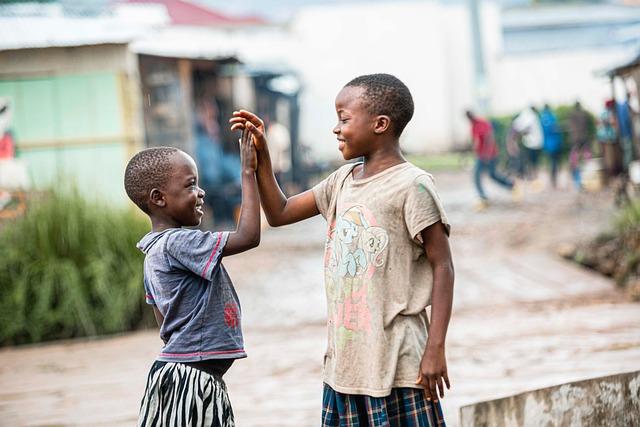Introduction
Burundi, a small landlocked nation in East Africa, is emerging as a beacon of hope in the realm of educational reform and innovation.Under the auspices of the World Bank’s “Learning of the Future” initiative, the contry is embarking on a transformative journey aimed at redefining its educational landscape. With a population that is predominantly young and a growing recognition of the pivotal role education plays in national growth, Burundi stands at a crossroads where the need for modernized teaching methodologies and curriculum is more pressing than ever. This article delves into the ambitious strategies being implemented in Burundi, highlighting key partnerships, innovative practices, and the challenges that must be overcome as the nation strives for an educational system that not only meets the needs of its citizens but also prepares them for a rapidly changing world. Join us as we explore how Burundi is positioning itself on the path to a brighter, more inclusive future through education.
Understanding the Current Educational Landscape in Burundi

The educational landscape in Burundi is currently characterized by both challenges and opportunities that demand immediate attention. The recent initiatives proposed by the World Bank aim to transform this landscape into a more resilient and adaptive system capable of preparing students for the complexities of the modern world. Key challenges include:
- Access to Quality Education: Many rural areas lack sufficient educational facilities and qualified teachers.
- High Dropout Rates: Socioeconomic factors contribute to a important number of students leaving school prematurely.
- Curriculum relevance: The existing curriculum often fails to meet contemporary educational needs.
In response to these challenges, the World Bank has highlighted several strategic actions that could help revolutionize the educational framework, including the promotion of digital learning platforms, teacher training programs, and community engagement initiatives. These strategies emphasize:
- Digital Learning: Integrating technology in classrooms to foster interactive learning experiences.
- Capacity Building: Strengthening the skills of educators to enhance teaching effectiveness.
- Community Involvement: Encouraging parental and local community participation in the schooling process.
| Strategic Action | Expected Outcome |
|---|---|
| Implementing Digital Tools | Increased student engagement and improved learning outcomes. |
| Teacher Training Programs | Enhanced teaching quality and student performance. |
| Strengthening Community Ties | Improved school attendance and retention rates. |
Innovative Approaches to Curriculum Development for Future Skills

as Burundi embarks on its journey toward a transformative educational framework, innovative approaches to curriculum development are essential to equip students with the skills necessary for the future. By integrating project-based learning, collaborative tasks, and digital literacy into the curriculum, Burundi’s education system can become more responsive to the rapidly changing global landscape. stakeholders are encouraged to focus on the following strategies:
- Interdisciplinary Learning: Linking subjects such as science and art to foster creativity and critical thinking.
- Local Contextualization: Adapting global educational frameworks to reflect local culture and challenges, ensuring relevance and engagement.
- Use of Technology: Incorporating digital tools and resources to facilitate interactive learning.
Implementing these strategies requires collaboration among educators, policymakers, and private sectors to develop a flexible curriculum that evolves with the needs of society. A planned approach towards assessing skill gaps and integrating feedback mechanisms will provide insight into the effectiveness of these curricula.Below is a simple overview of the critical components in developing a future-ready curriculum:
| Component | Description | Impact |
|---|---|---|
| Curricular Versatility | Adjusting content based on needs | Enhances relevance |
| Skills Integration | Blending soft and hard skills | Improved employability |
| Continuous assessment | Regular feedback to learners | Encourages growth |
leveraging Technology to Enhance Learning Opportunities

In Burundi, the integration of technology into the educational landscape is paving the way for a transformative learning experience. With a focus on accessibility and innovation, educators are utilizing various digital tools to foster an engaging environment for students. The following initiatives exemplify this shift:
- Online Learning platforms: These platforms provide access to a variety of resources, enabling students to learn at their own pace.
- Interactive Classroom Technologies: Smart boards and tablets enhance interactivity, allowing for personalized learning and collaboration among peers.
- Mobile Applications: Educational apps cater to diverse learning styles, equipping students with the skills needed for the future workforce.
The commitment to harness technology in education extends to teacher training programs as well. By equipping educators with the necessary skills to utilize these tools effectively, Burundi aims to cultivate a generation equipped for the demands of a rapidly evolving job market. This complete approach is further illustrated in the table below:
| Technology | Impact on Learning |
|---|---|
| Virtual Classrooms | Promotes inclusivity and remote learning |
| Learning Management Systems | Streamlines course management and student progress tracking |
| STEM Kits | Encourages hands-on learning and critical thinking |
Fostering Partnerships for sustainable Educational growth

In Burundi, fostering collaborative relationships between educational institutions, government agencies, and the private sector is essential for igniting a sustainable learning ecosystem. By integrating various stakeholders, the aim is to create a holistic approach to education that not only enhances academic performance but also equips students with essential skills for the future. Key areas of focus include:
- teacher Training: Implementing professional development programs to upskill educators.
- Curriculum Development: Ensuring educational content is relevant to local and global contexts.
- Technology Integration: Promoting digital learning tools tailored to enhance accessibility and engagement.
Moreover, forming partnerships with community organizations and international donors can lead to increased funding and resources, thereby expanding opportunities for students across the nation. A unified strategy can significantly impact educational outcomes and drive economic growth. Consider the following initiatives:
| Partnership Initiative | Outcome |
|---|---|
| Public-Private Partnerships | Improved infrastructure and access to facilities |
| NGO Collaborations | Enhanced support for marginalized communities |
| international Aid Programs | Increased resources for innovative learning strategies |
Addressing Challenges and Barriers in the Education System

Burundi faces a myriad of challenges within its education system, which significantly hampers the pursuit of quality learning and academic achievement. The lack of adequate infrastructure, coupled with insufficient training for educators, remains a persistent barrier. Many schools are under-resourced and poorly maintained, resulting in an environment that is not conducive to learning. Moreover, cultural attitudes towards education can limit engagement, especially among marginalized groups, such as girls. Addressing these issues is crucial for enabling access to education and ensuring equitable opportunities for all children.
to effectively navigate these obstacles, targeted approaches are necessary. Key strategies include:
- Investment in School Infrastructure: Improving physical facilities to create safe,engaging,and functional learning spaces.
- Teacher Training Programs: Enhancing professional development opportunities aimed at equipping educators with modern teaching methodologies.
- Community Awareness initiatives: promoting the importance of education through local outreach, particularly focusing on gender equity.
In addition to these strategies, collaboration between government bodies, NGOs, and international organizations is essential. By fostering a partnership model,resources and expertise can be pooled to address systemic issues effectively.The table below highlights key areas affected by these barriers and the proposed actions to combat them:
| Area of Impact | challenges | Proposed Actions |
|---|---|---|
| Infrastructure | Insufficient facilities | Renovation and construction funding |
| Teacher Capacity | Lack of training | Continuous professional development workshops |
| Community Engagement | Low awareness of education value | Grassroots campaigns promoting education |
Policy Recommendations for a Future-Ready Workforce in Burundi

To cultivate a workforce that is equipped for the challenges of tomorrow, it is imperative for Burundi to focus on several strategic areas. Investment in digital literacy should be prioritized to enable young students to navigate and thrive in an increasingly tech-driven world. This includes not only access to digital tools but also structured programs that teach coding, data analysis, and cybersecurity. Additionally, fostering partnerships with the private sector can bridge the gap between education and workforce needs. By collaborating with local businesses, educational institutions can ensure curricula remain relevant, providing students with practical skills that align with market demands.
Furthermore,promoting lifetime learning opportunities can empower individuals to continuously adapt to changing job markets. This can be achieved through the establishment of community learning centers that offer adult education programs and professional development workshops. The government should also consider policy incentives for organizations that invest in employee training programs, encouraging a culture of continuous improvement within the workforce. To effectively implement these recommendations, a detailed action plan and stakeholder engagement is essential, ensuring that initiatives are both sustainable and inclusive for all segments of the population.
In Summary
Burundi’s journey towards embracing the concept of “learning of the future,” as highlighted by the World Bank, reflects a significant commitment to redefining its educational landscape. By prioritizing innovative teaching methods, integrating technology into classrooms, and fostering a culture of lifelong learning, the nation is not only addressing immediate educational challenges but also paving the way for sustainable economic growth and social development. As Burundi navigates this transformative path,it serves as a compelling case study for othre developing nations aiming to harness the power of education as a catalyst for change.With robust support from international partners and a dedicated focus on inclusive policies, Burundi stands at the cusp of a new era, where the potential of its youth can be fully realized, shaping a brighter future for generations to come.
Source link : https://afric.news/2025/03/11/burundi-on-the-path-of-learning-of-the-future-world-bank/
Author : Charlotte Adams
Publish date : 2025-03-11 08:12:00
Copyright for syndicated content belongs to the linked Source.



